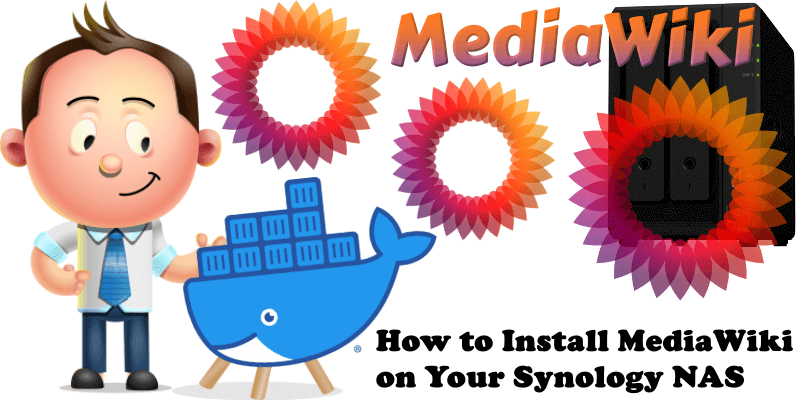
MediaWiki is a free and open-source wiki software package written in PHP. It serves as the platform for Wikipedia and the other Wikimedia projects, used by hundreds of millions of people each month. MediaWiki is localized in over 350 languages and its reliability and robust feature set have earned it a large and vibrant community of third-party users and developers. In this step by step guide I will show you how to install MediaWiki on your Synology NAS using Docker & Portainer.
STEP 1
Please Support My work by Making a Donation.
STEP 2
Install Portainer using my step by step guide. If you already have Portainer installed on your Synology NAS, skip this STEP. Attention: Make sure you have installed the latest Portainer version.
STEP 3
Make sure you have a synology.me Wildcard Certificate. Follow my guide to get a Wildcard Certificate. If you already have a synology.me Wildcard certificate, skip this STEP.
STEP 4
Go to Control Panel / Login Portal / Advanced Tab / click Reverse Proxy. Follow the instructions in the image below.
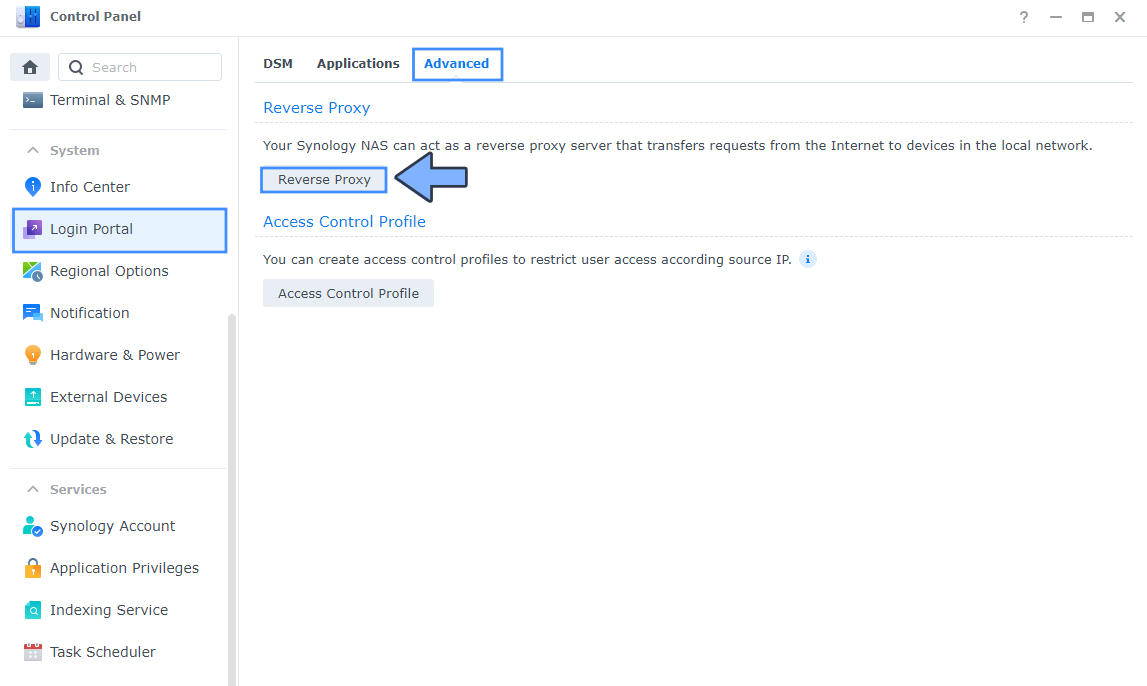
STEP 5
Now click the “Create” button. Follow the instructions in the image below.
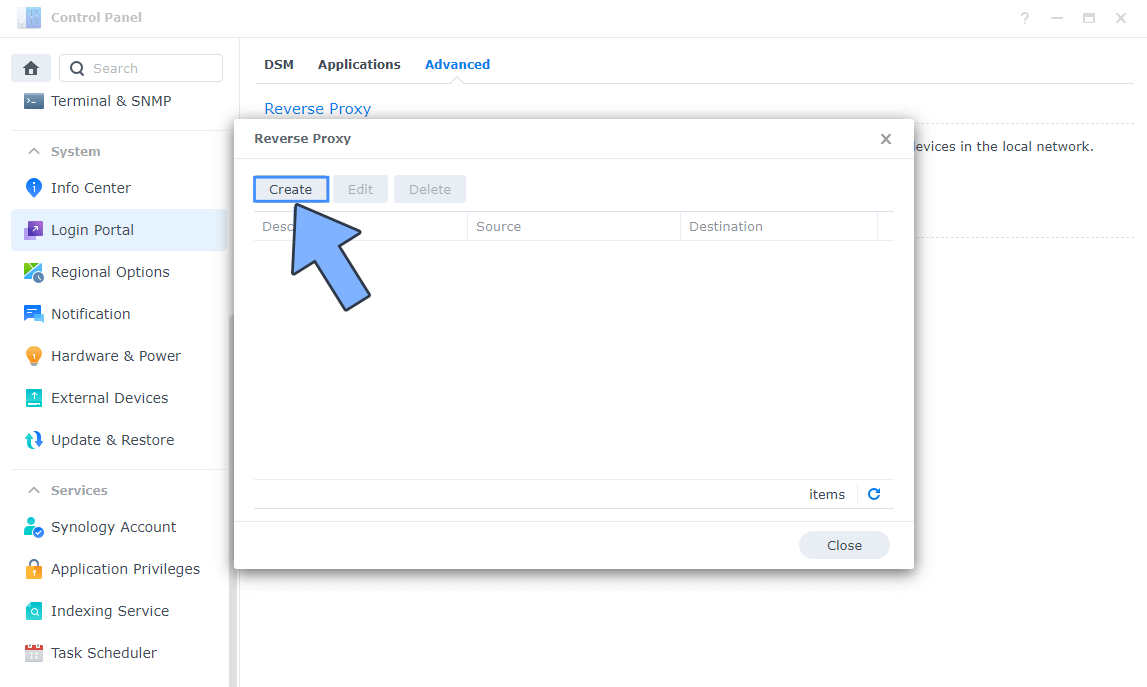
STEP 6
After you click the Create button, the window below will open. Follow the instructions in the image below.
On the General area, set the Reverse Proxy Name description: type in MediaWiki. After that, add the following instructions:
Source:
Protocol: HTTPS
Hostname: mediawiki.yourname.synology.me
Port: 443
Check Enable HSTS
Destination:
Protocol: HTTP
Hostname: localhost
Port: 8795
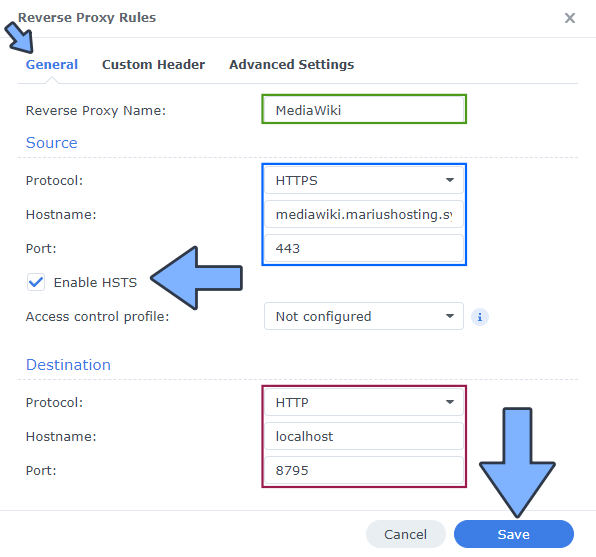
STEP 7
On the Reverse Proxy Rules click the Custom Header tab. Click Create and then, from the drop-down menu, click WebSocket. After you click on WebSocket, two Header Names and two Values will be automatically added. Click Save. Follow the instructions in the image below.

STEP 8
Go to Control Panel / Network / Connectivity tab/ Check Enable HTTP/2 then click Apply. Follow the instructions in the image below.
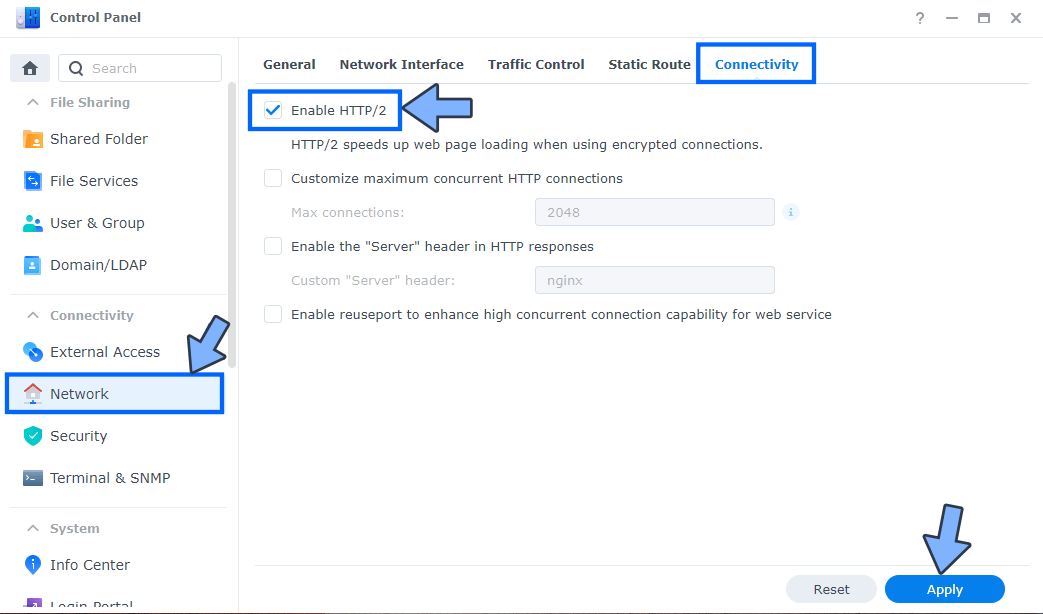
STEP 9
Go to Control Panel / Security / Advanced tab/ Check Enable HTTP Compression then click Apply. Follow the instructions in the image below.
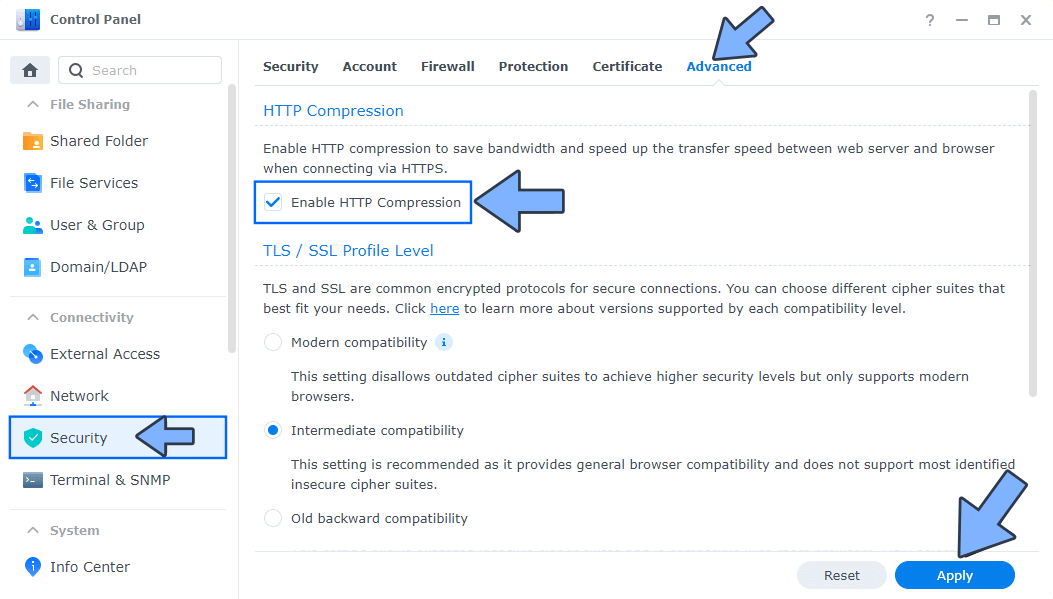
STEP 10
Go to File Station and open the docker folder. Inside the docker folder, create one new folder and name it mediawiki. Follow the instructions in the image below.
Note: Be careful to enter only lowercase, not uppercase letters.
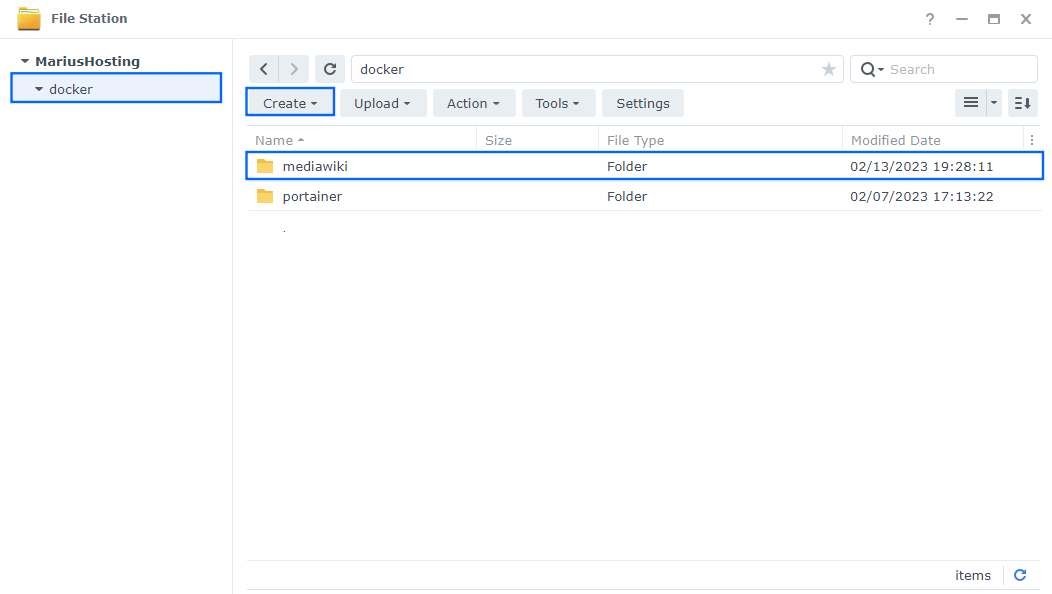
STEP 11
Now create two new folders inside the mediawiki folder that you created at STEP 10 and name them data and db. Follow the instructions in the image below.
Note: Be careful to enter only lowercase, not uppercase letters.
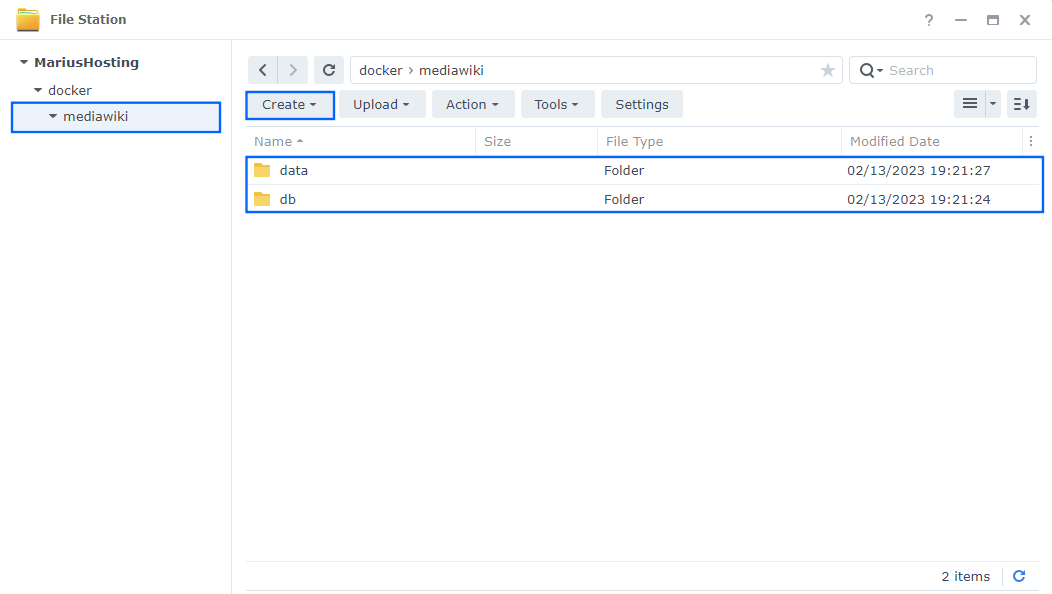
STEP 12
Right click on the mediawiki folder that you have previously created at STEP 10 then click Properties. Follow the instructions in the image below.
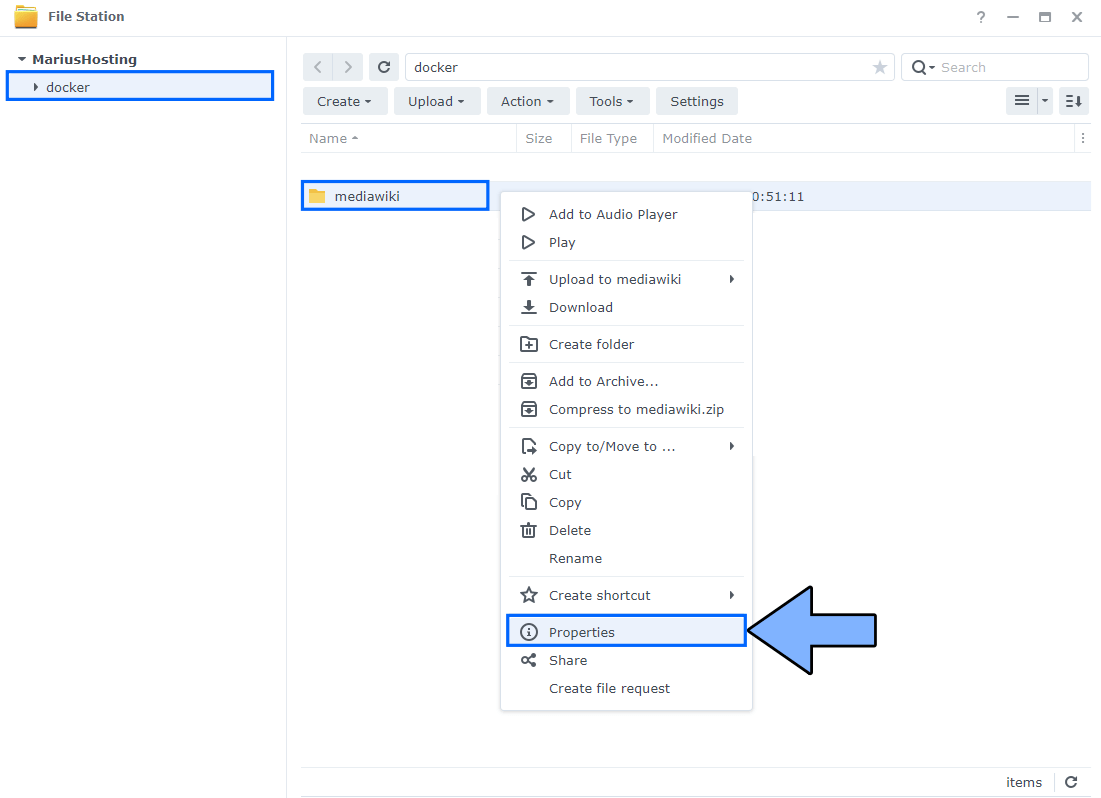
STEP 13
Go to the Permission tab then click Advanced options. From the drop-down menu choose “Make inherited permissions explicit“. Follow the instructions in the image below.
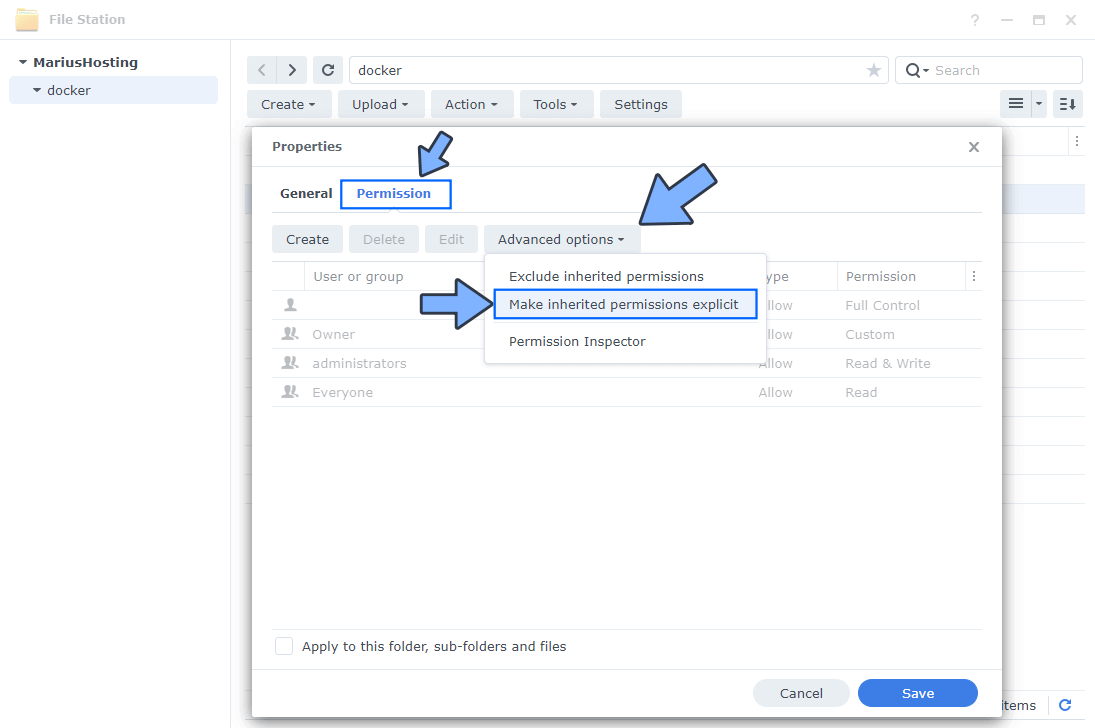
STEP 14
Select Everyone then click the Edit tab. Follow the instructions in the image below.
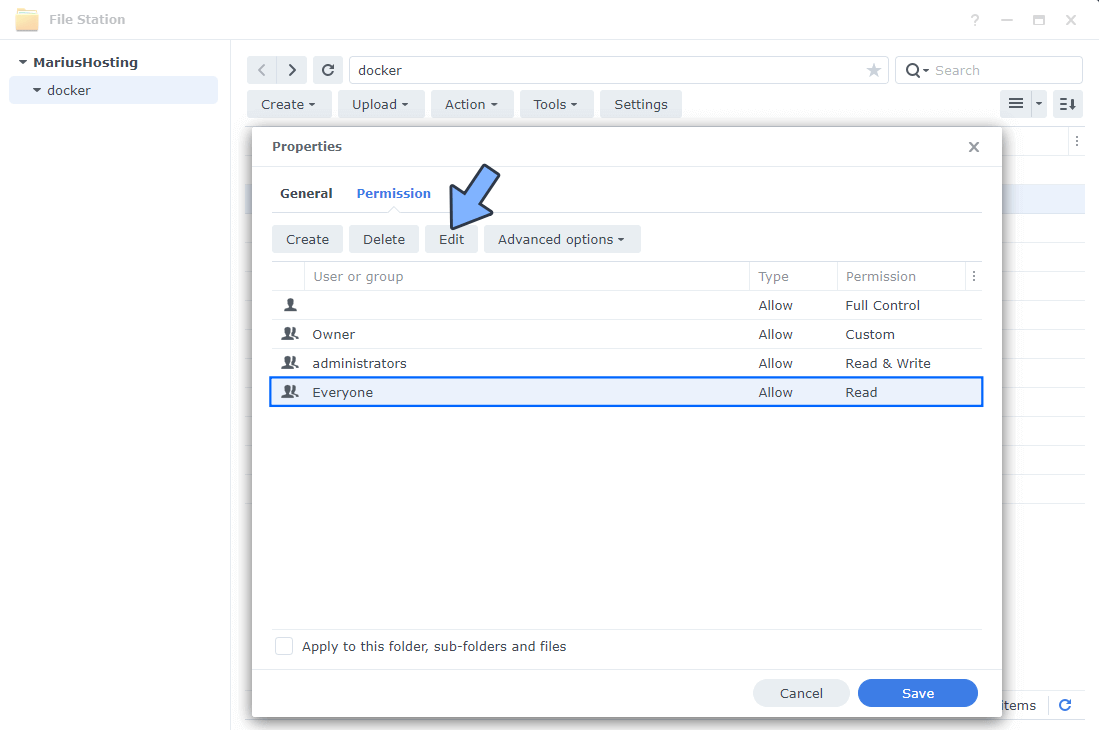
STEP 15
Check all Read and Write Permissions. Click Done. Follow the instructions in the image below.
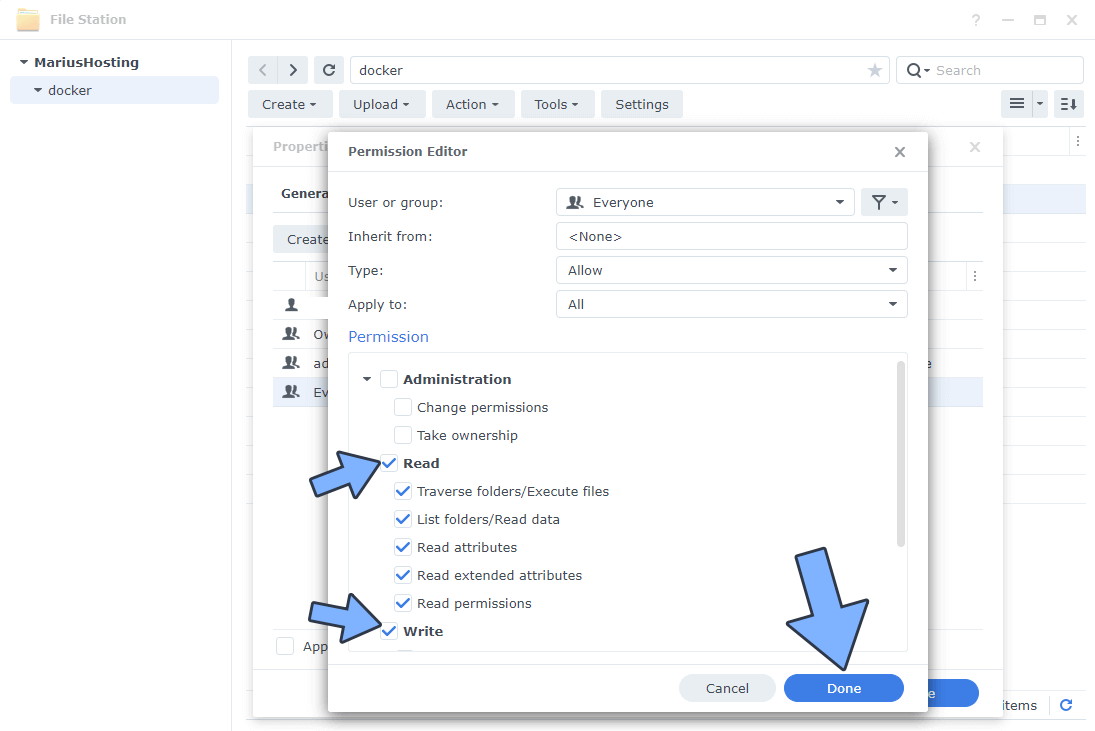
STEP 16
After you click Done on STEP 15, check “Apply to this folder, sub-folders and files“. Click Save. Follow the instructions in the image below.
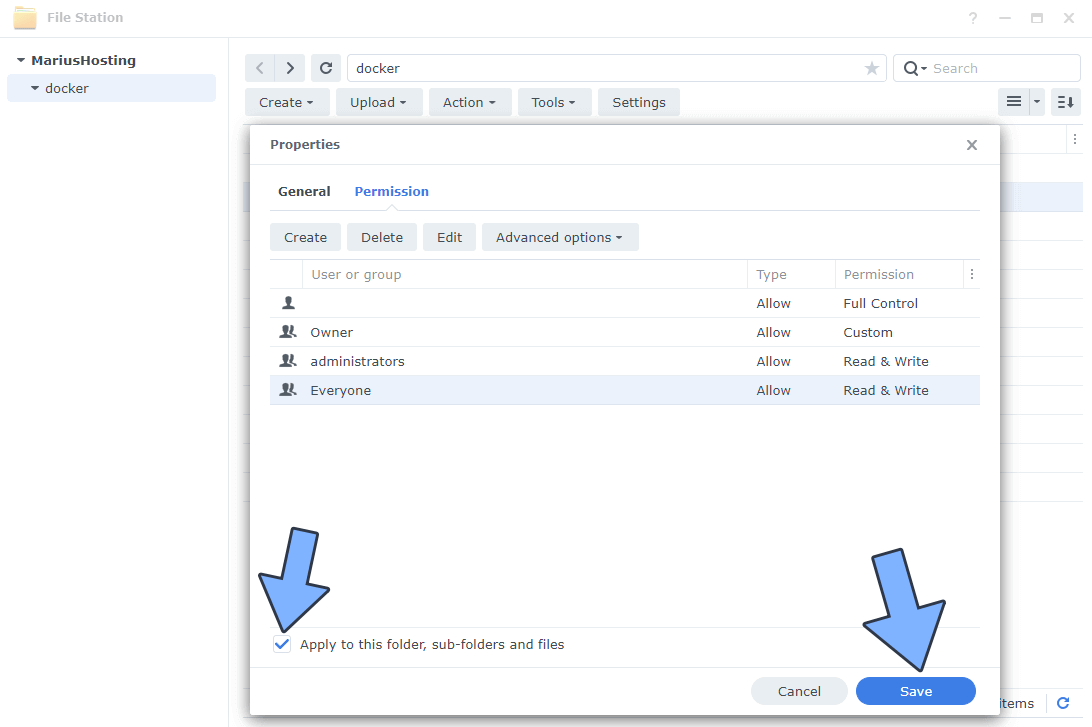
STEP 17
Log into Portainer using your username and password. On the left sidebar in Portainer, click on Home then Live connect. Follow the instructions in the image below.

On the left sidebar in Portainer, click on Stacks then + Add stack. Follow the instructions in the image below.

STEP 18
In the Name field type in mediawiki. Follow the instructions in the image below.
services:
db:
image: mariadb:11.8-noble #LTS Long Time Support Until October 15, 2033.
container_name: MediaWiki-DB
hostname: mediawiki-db
security_opt:
- no-new-privileges:false
environment:
- MYSQL_ROOT_PASSWORD=rootpass
- MYSQL_DATABASE=mediawiki
- MYSQL_USER=mediawikiuser
- MYSQL_PASSWORD=mediawikipass
- TZ=Europe/Bucharest
volumes:
- /volume1/docker/mediawiki/db:/var/lib/mysql:rw
restart: on-failure:5
mediawiki:
image: mediawiki:latest
container_name: MediaWiki
hostname: mediawiki
security_opt:
- no-new-privileges:true
healthcheck:
test: curl -f http://localhost:80 || exit 1
ports:
- 8795:80
volumes:
- /volume1/docker/mediawiki/data:/var/www/html/images:rw
#- /volume1/docker/mediawiki/LocalSettings.php:/var/www/html/LocalSettings.php
restart: on-failure:5
depends_on:
db:
condition: service_started
Note: Before you paste the code above in the Web editor area below, change the value for TZ. (Select your current Time Zone from this list.)
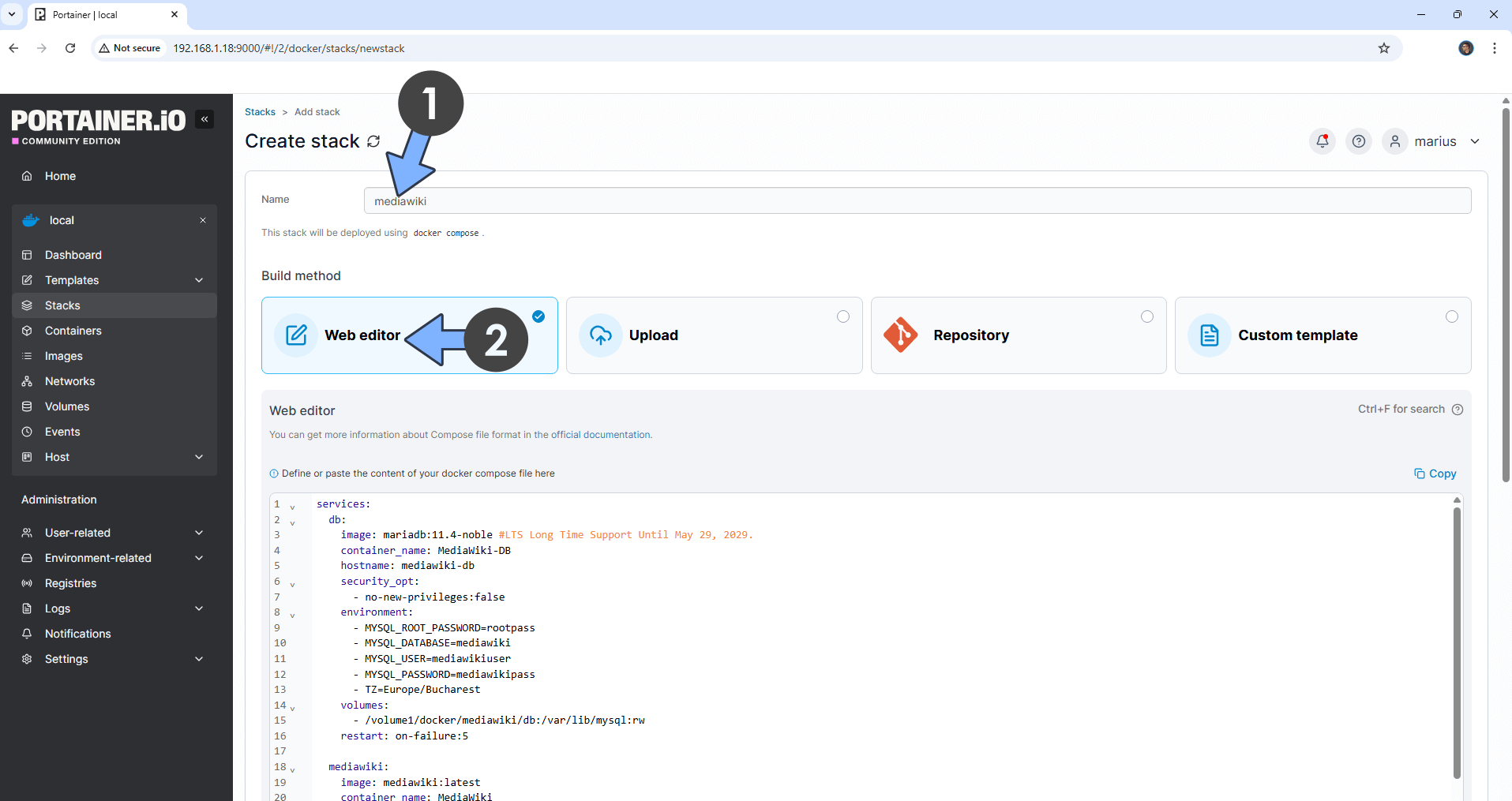
STEP 19
Scroll down on the page until you see a button named Deploy the stack. Click on it. Follow the instructions in the image below. The installation process can take up to a few minutes. It will depend on your Internet speed connection.
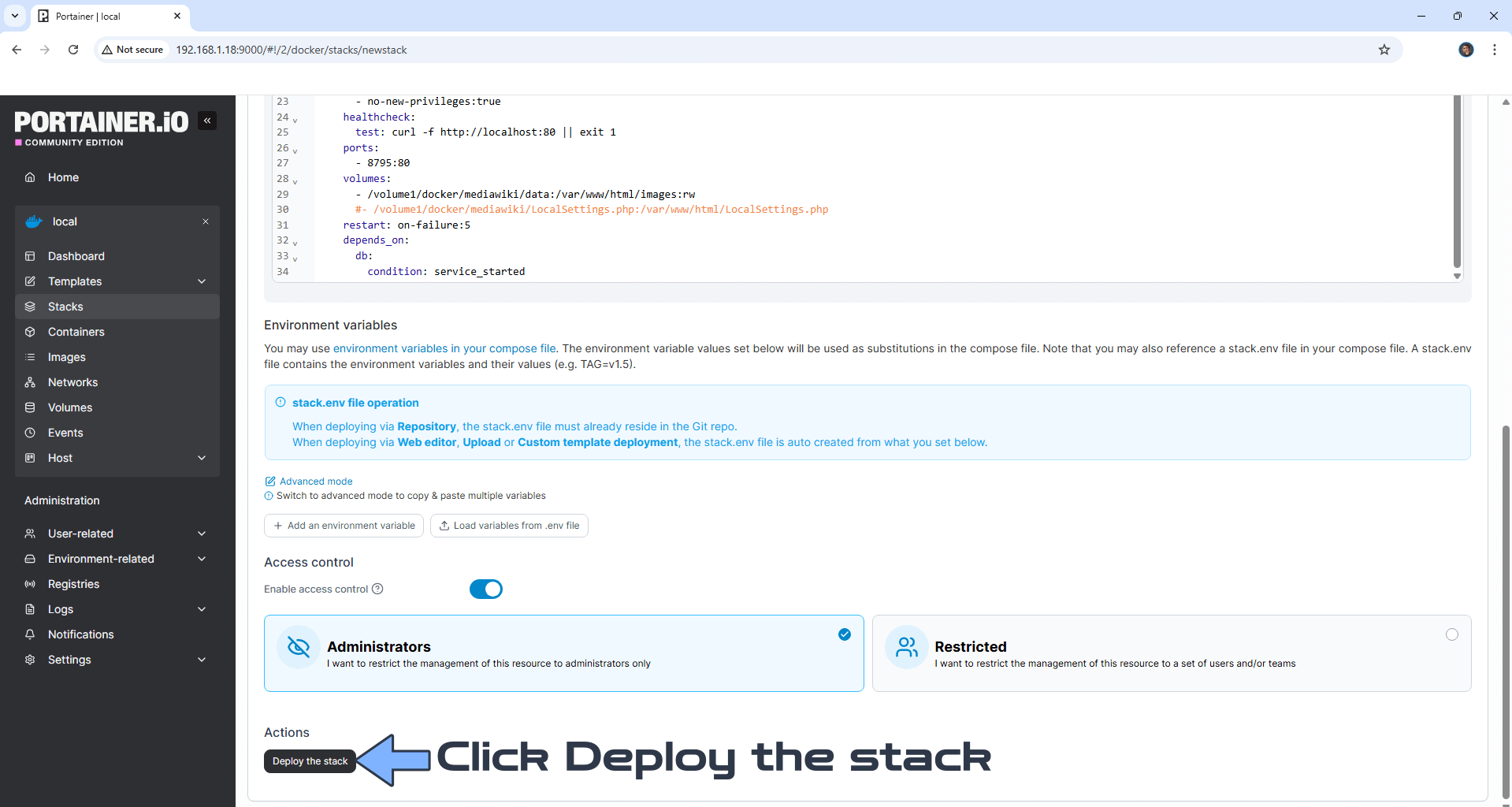
STEP 20
If everything goes right, you will see the following message at the top right of your screen: “Success Stack successfully deployed“.

STEP 21
🟢Please Support My work by Making a Donation. Almost 99,9% of the people that install something using my guides forget to support my work, or just ignore STEP 1. I’ve been very honest about this aspect of my work since the beginning: I don’t run any ADS, I don’t require subscriptions, paid or otherwise, I don’t collect IPs, emails, and I don’t have any referral links from Amazon or other merchants. I also don’t have any POP-UPs or COOKIES. I have repeatedly been told over the years how much I have contributed to the community. It’s something I love doing and have been honest about my passion since the beginning. But I also Need The Community to Support me Back to be able to continue doing this work.
STEP 22
Now open your browser and type in your HTTPS/SSL certificate like this https://mediawiki.yourname.synology.me In my case it’s https://mediawiki.mariushosting.synology.me If everything goes right, you will see the MediaWiki installation page. Click set up the wiki. Follow the instructions in the image below.
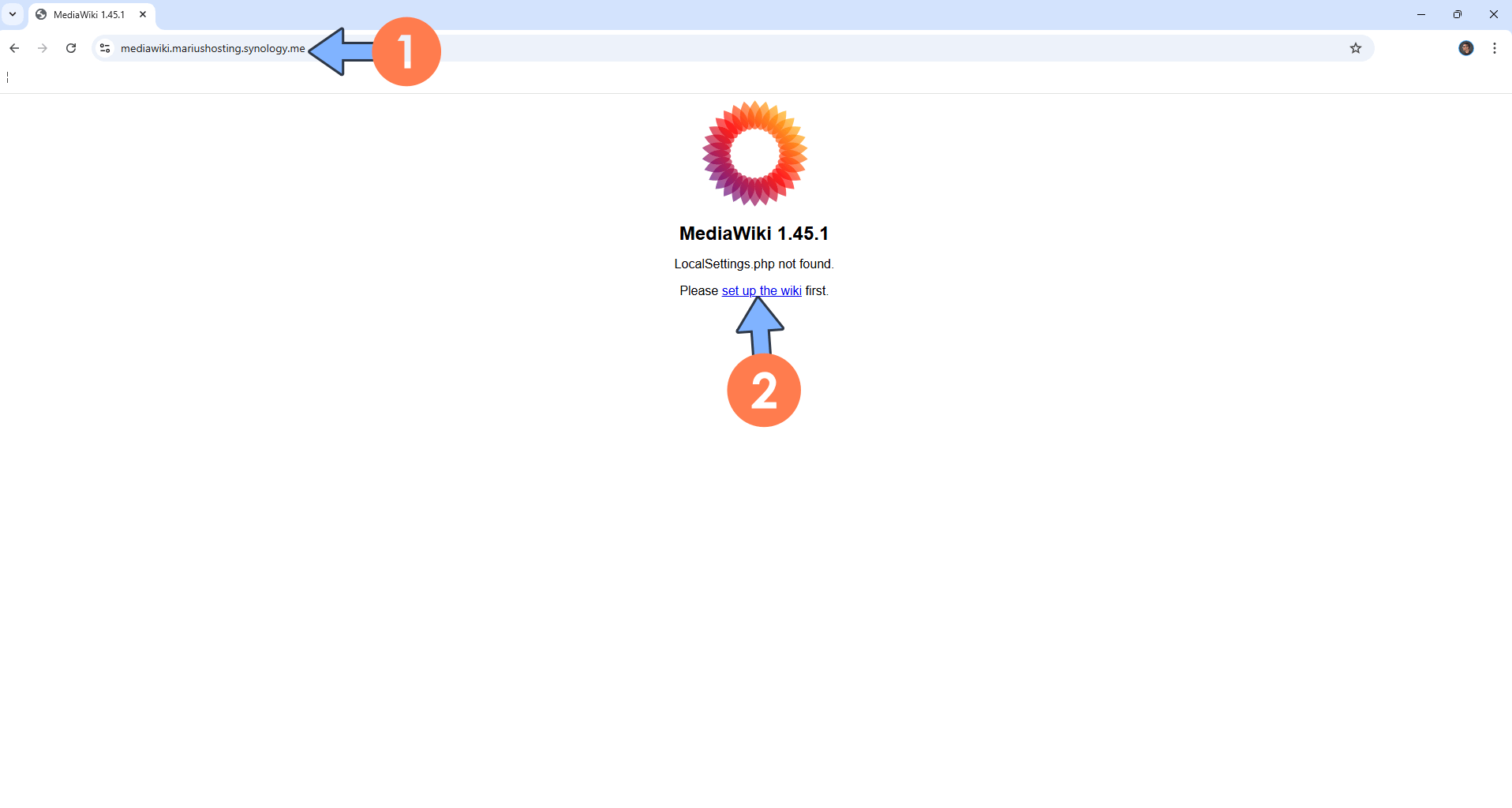
Select your language then click Continue. Follow the instructions in the image below.
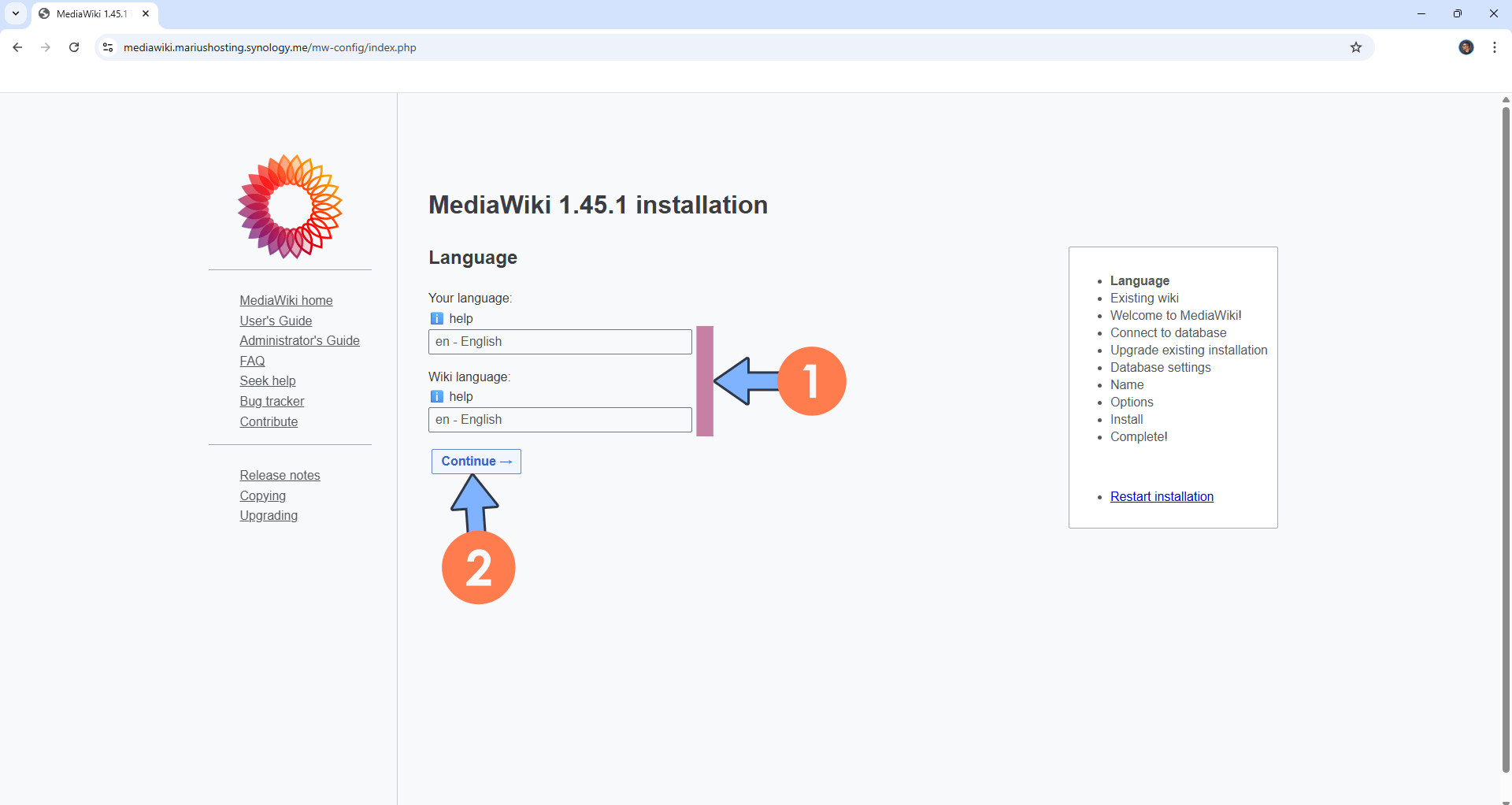
STEP 23
Click Continue. Follow the instructions in the image below.
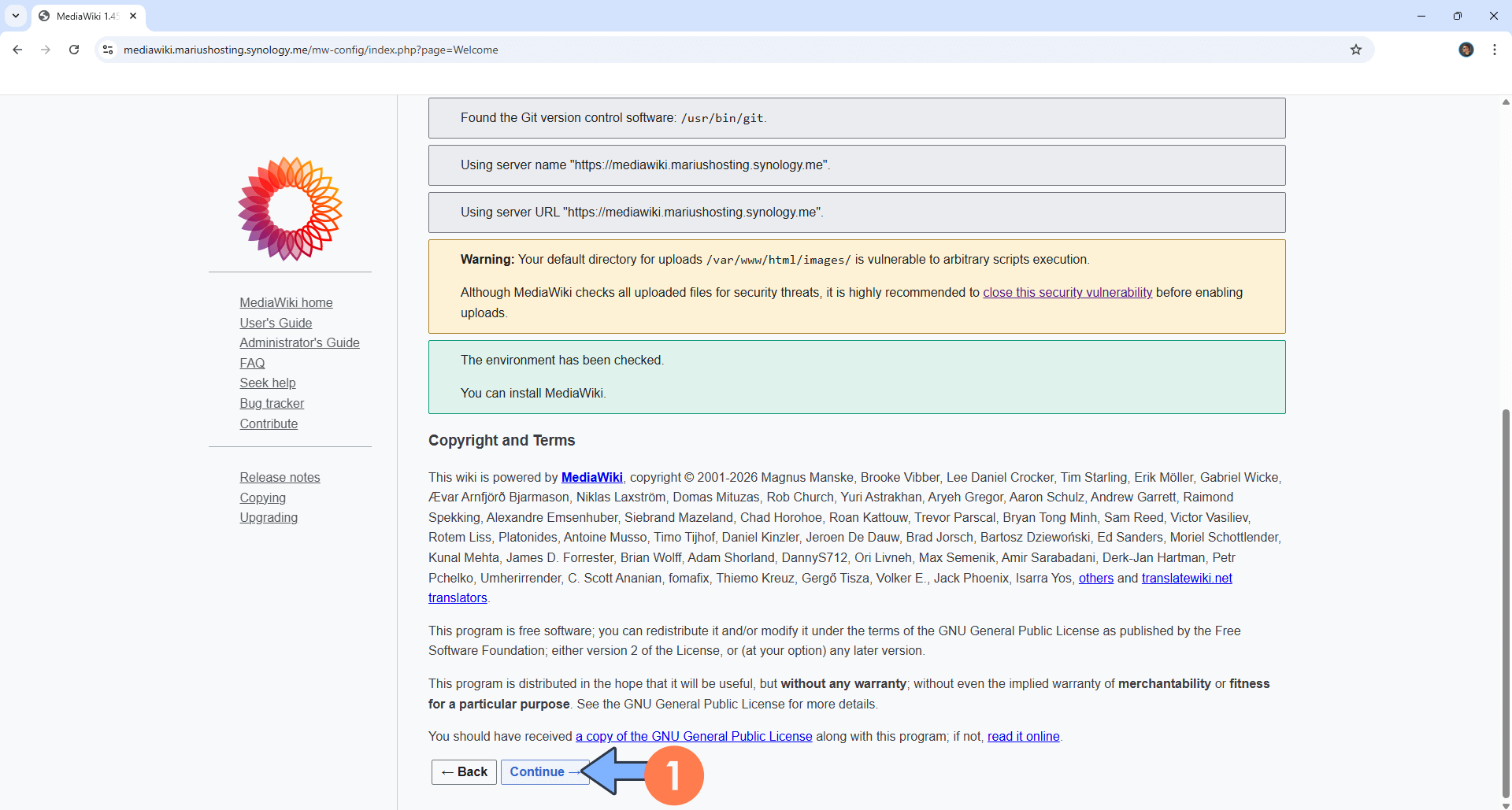
STEP 24
Select MariaDB as database then add the details below.
Database host: mediawiki-db
Database name: mediawiki
Database username: mediawikiuser
Database password: mediawikipass
Click Continue. Follow the instructions in the image below.
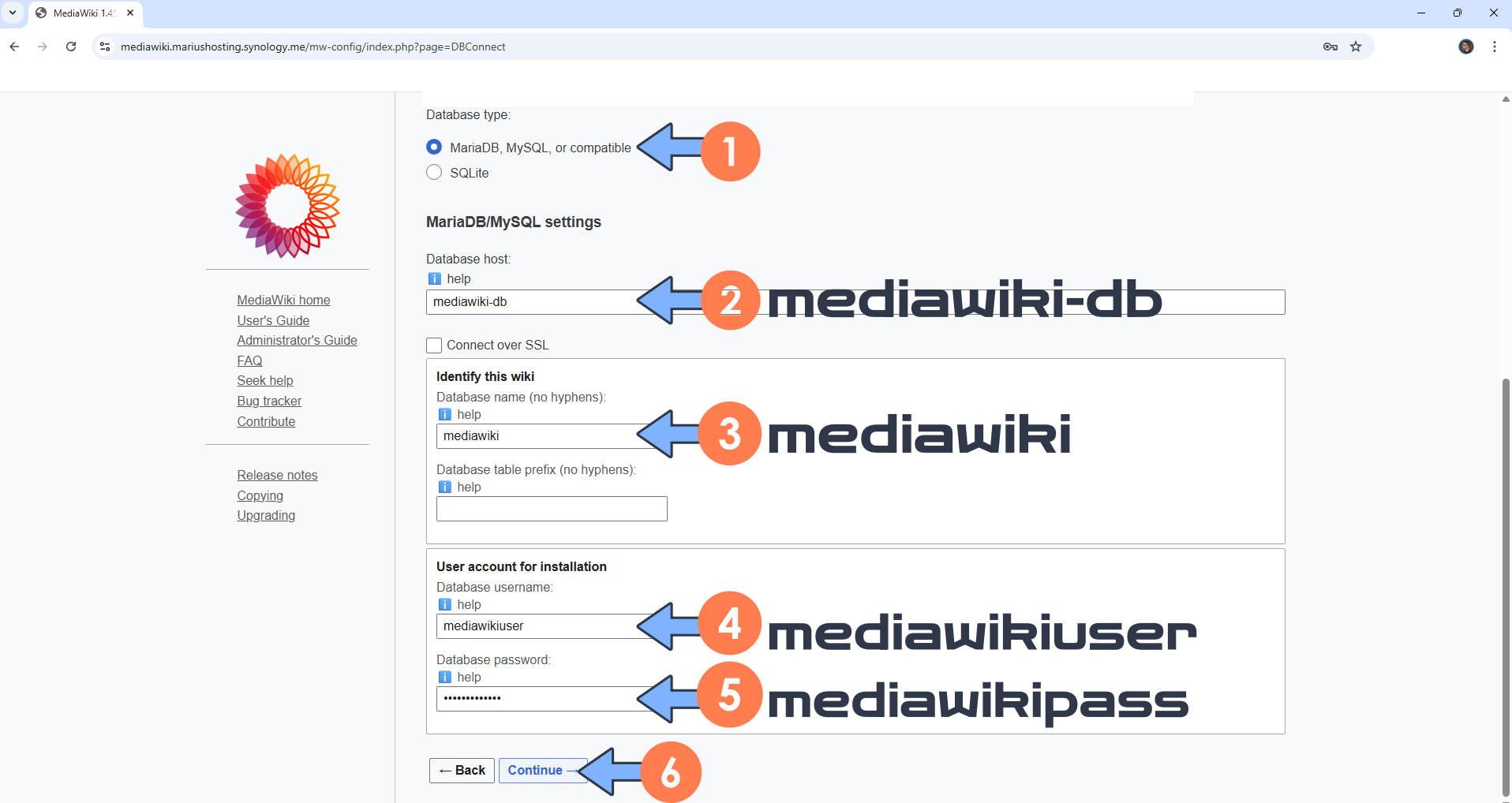
STEP 25
Check “Use the same account as for installation”. Click Continue. Follow the instructions in the image below.
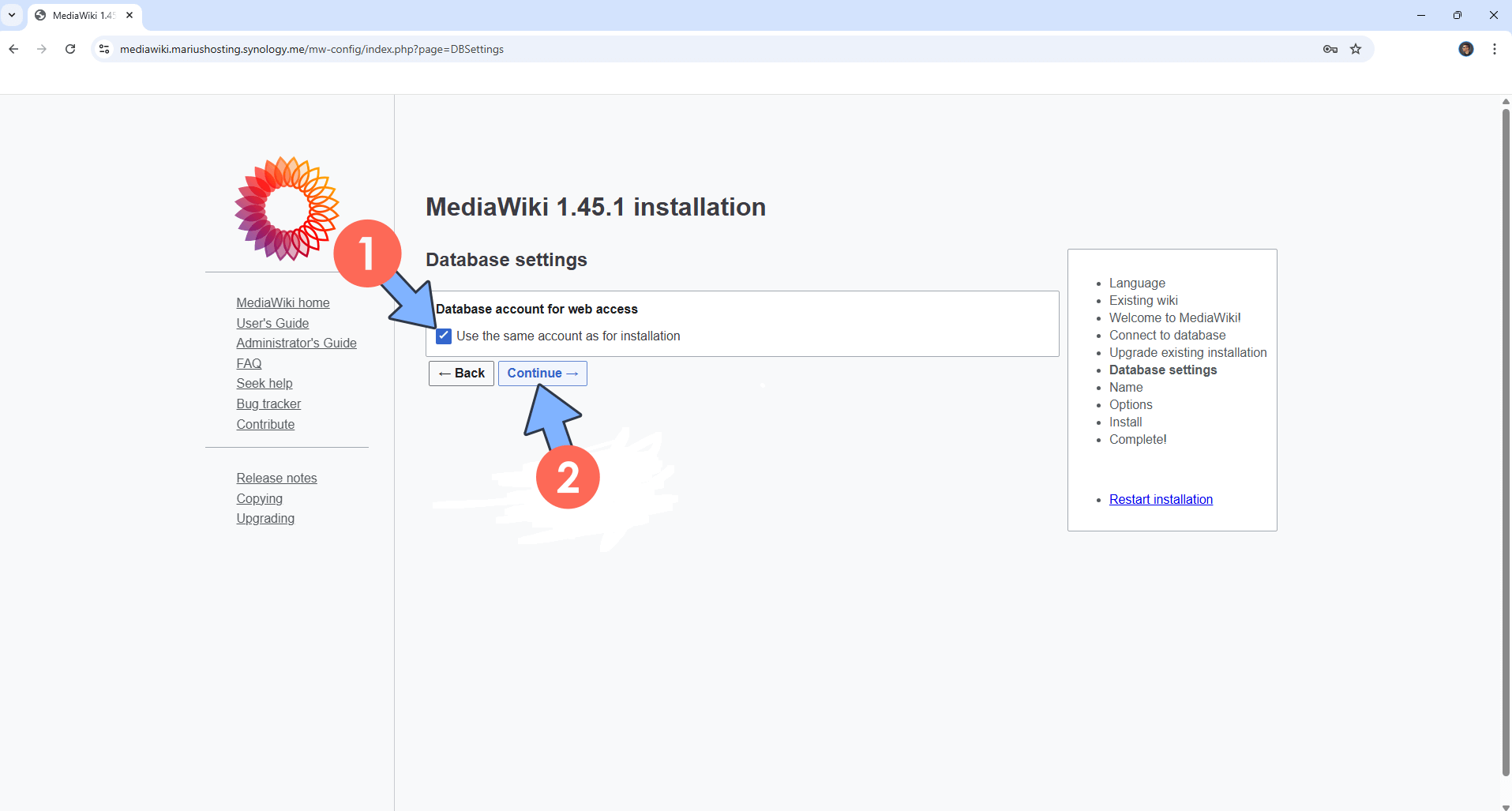
STEP 26
Check if the URL host name is correct. Type in the name that you want to give to your Wiki. Type in your own Username, Password and Email address. Uncheck the Share data option. Scroll down the page until you find the Continue button. Follow the instructions in the image below.
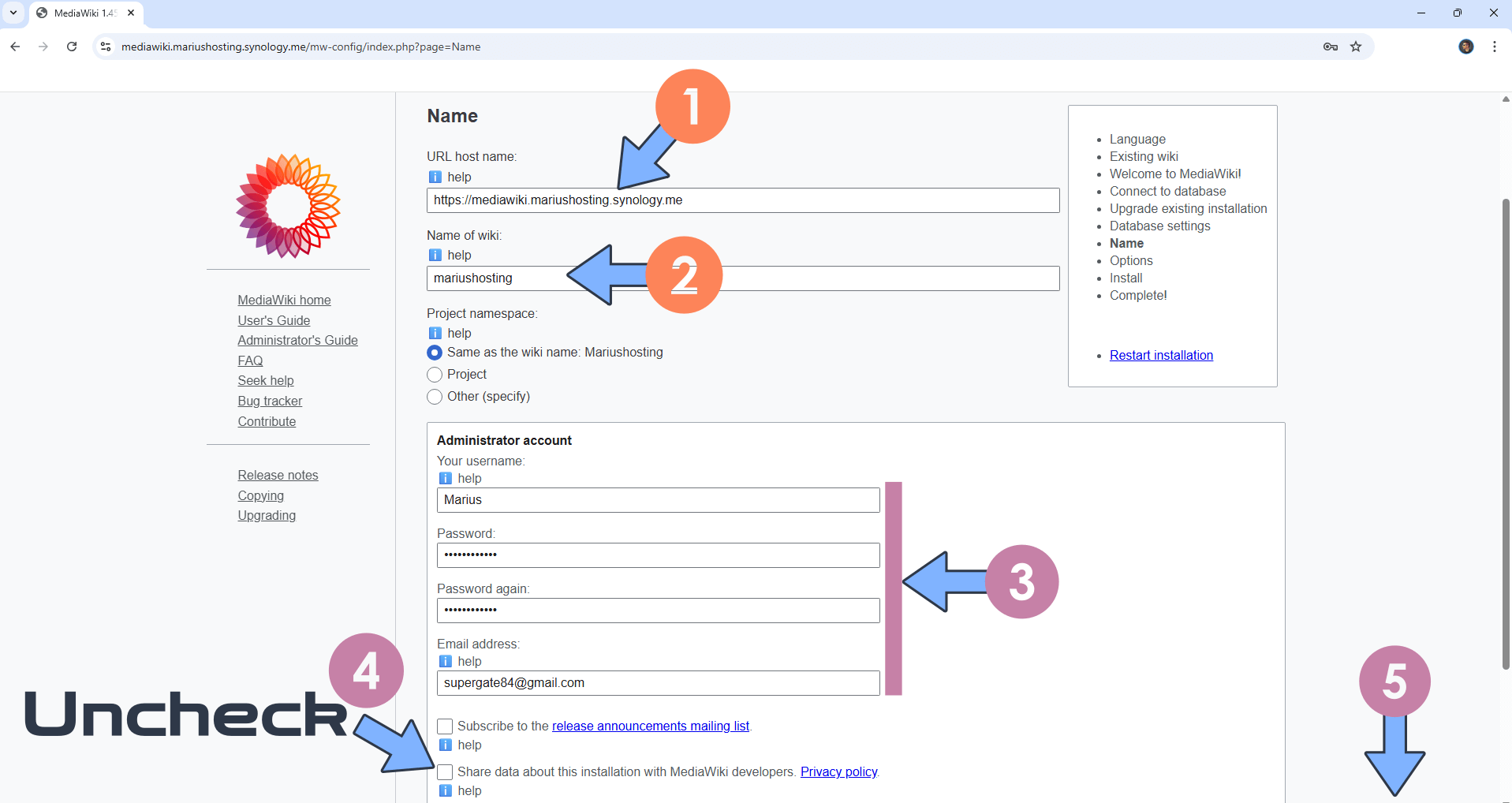
STEP 27
Select “Just install the wiki“. Click Continue. Follow the instructions in the image below.
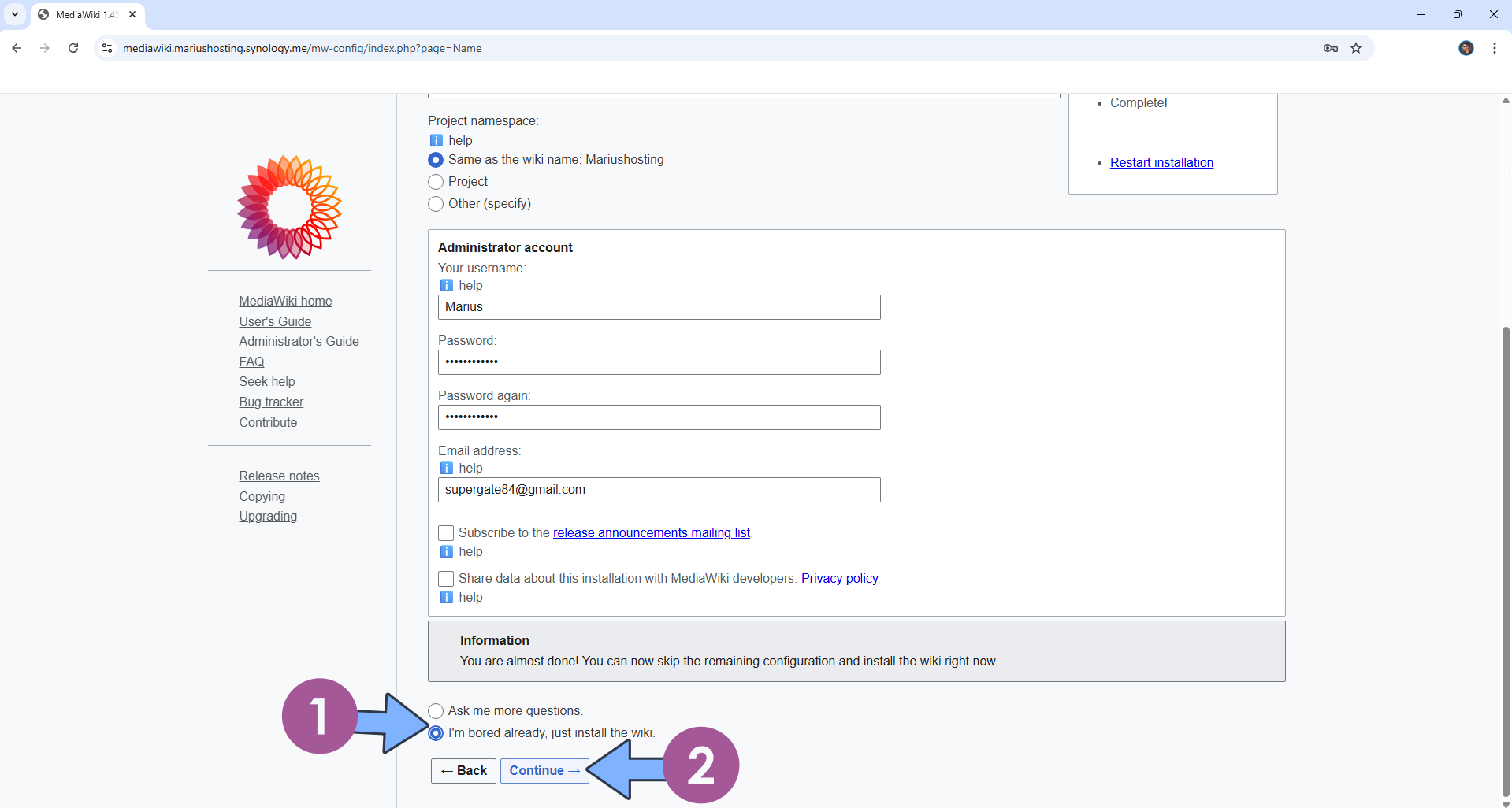
STEP 28
Click Continue. Follow the instructions in the image below.
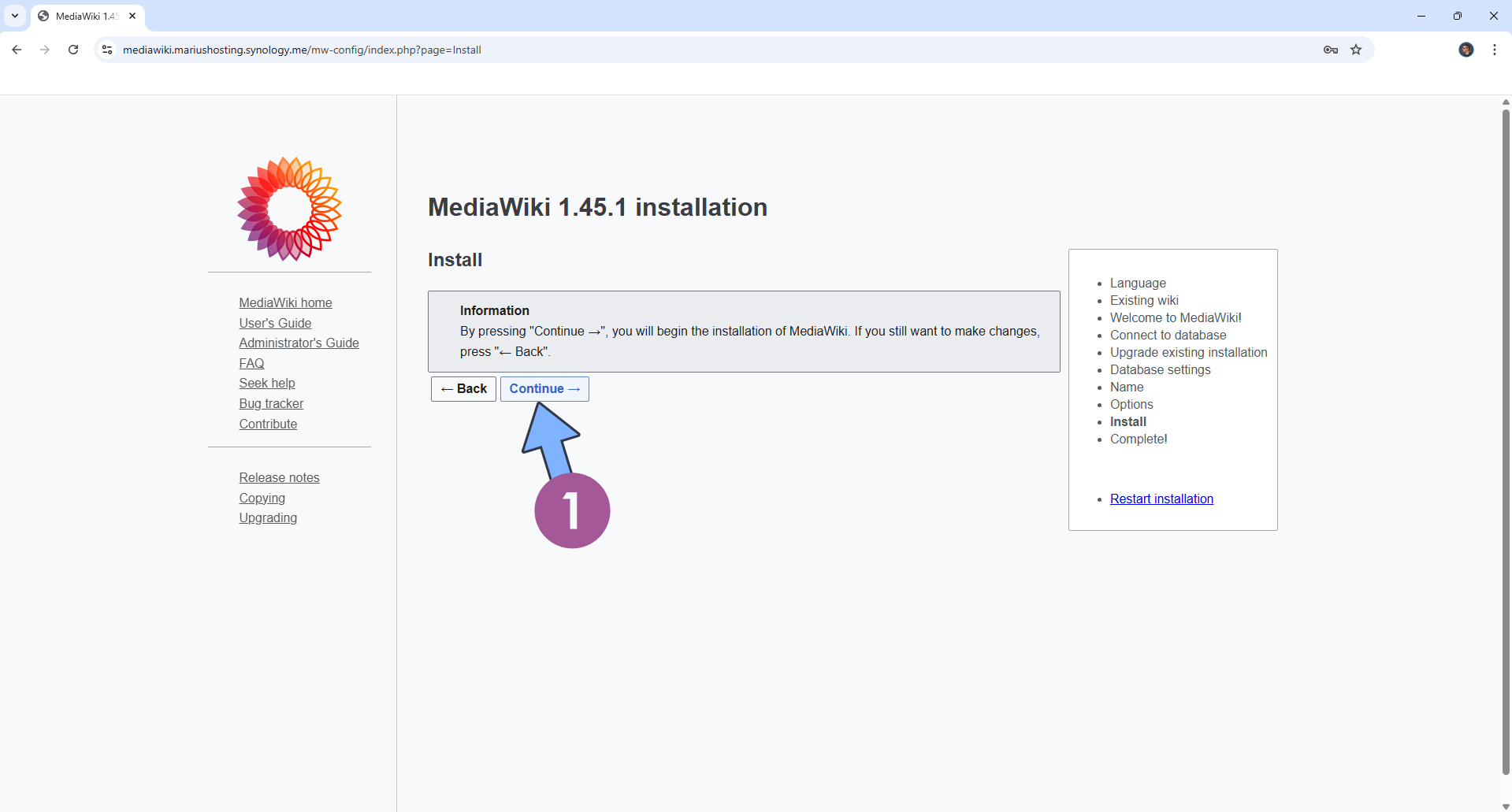
STEP 29
Click Continue. Follow the instructions in the image below.
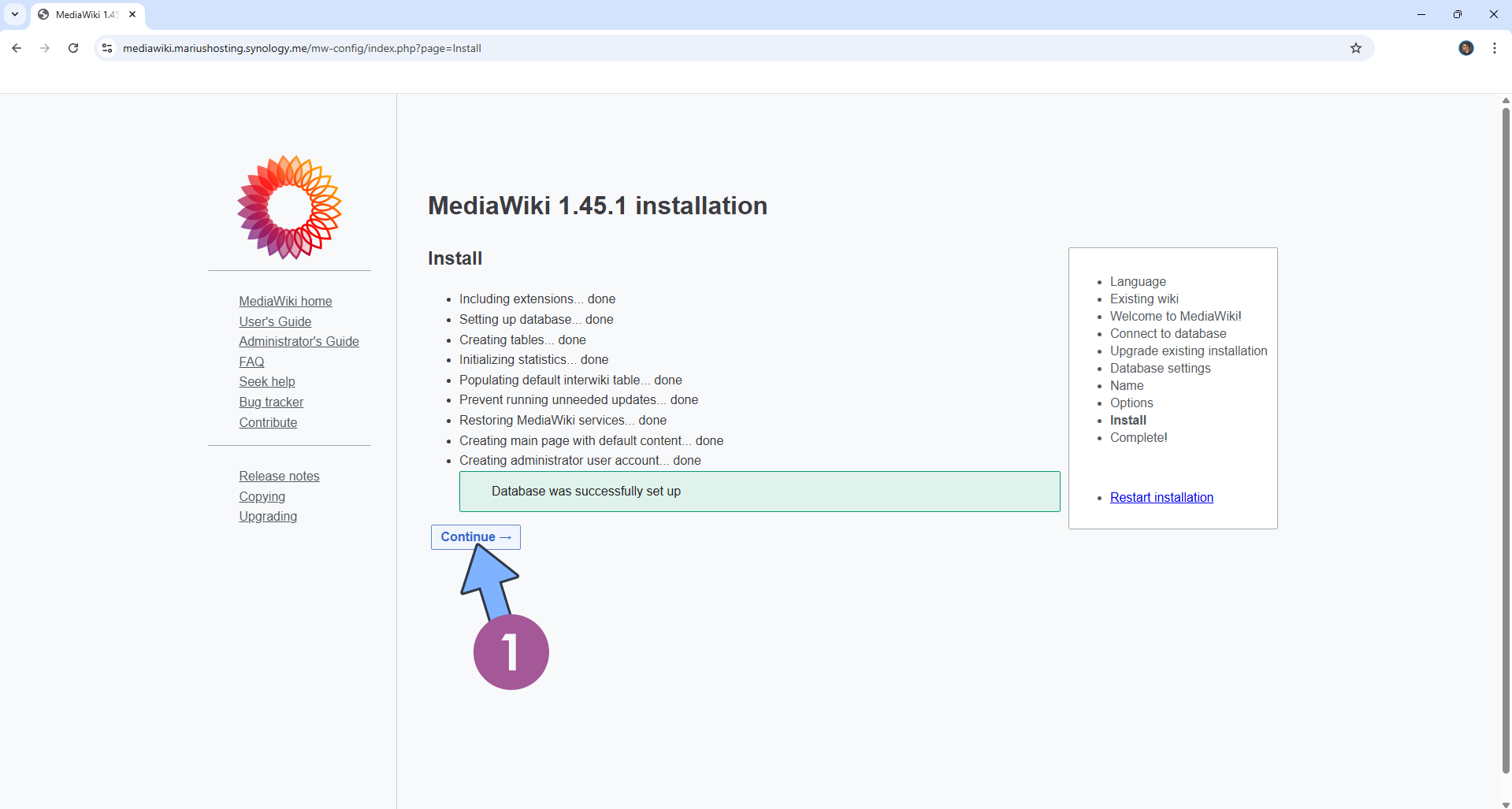
STEP 30
A LocalSettings.php file will be automatically downloaded to your PC. Go straight to the next STEP.
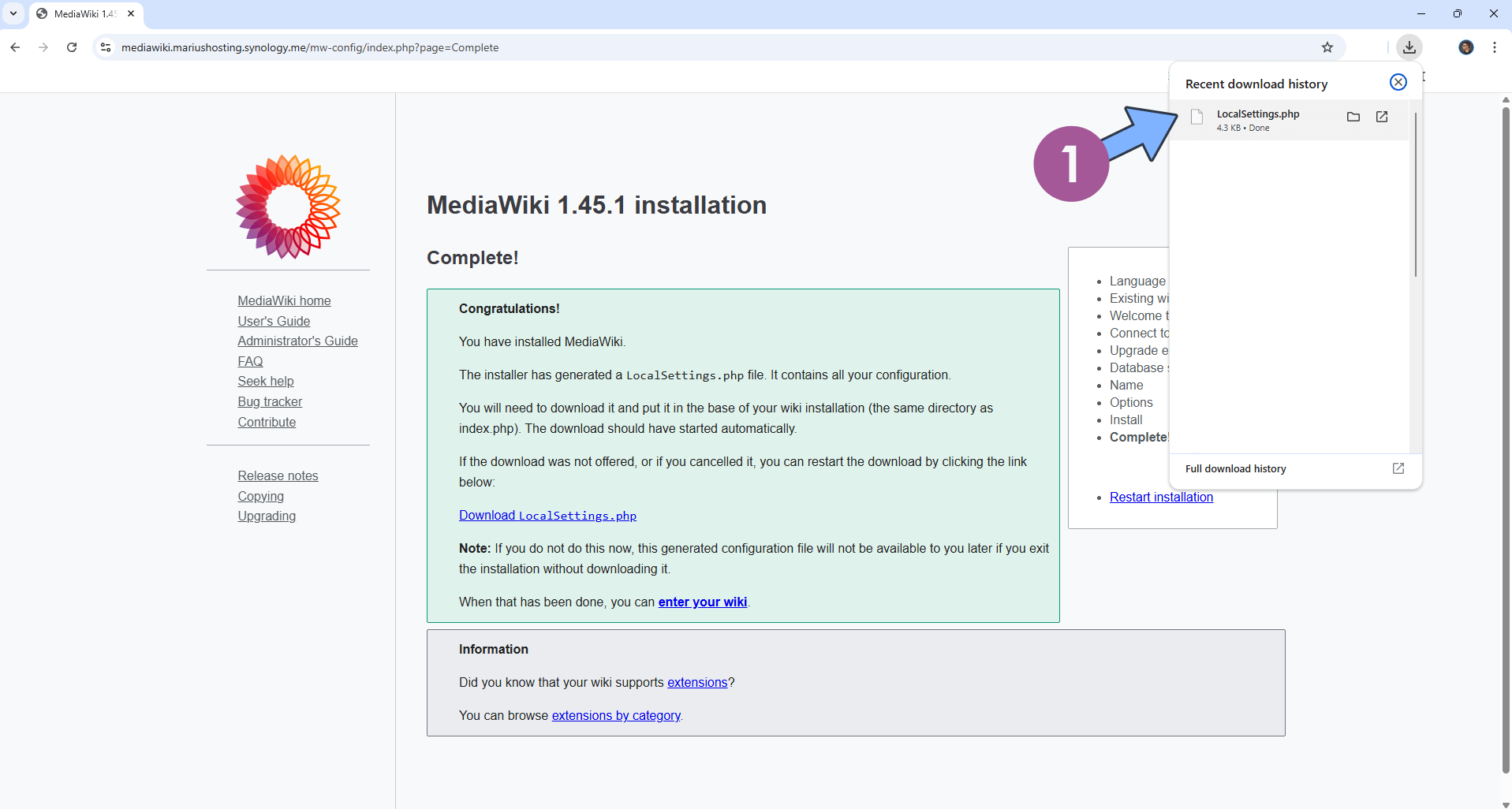
STEP 31
Upload the LocalSettings.php file inside your mediawiki folder that you have previously created at STEP 10. Follow the instructions in the image below.
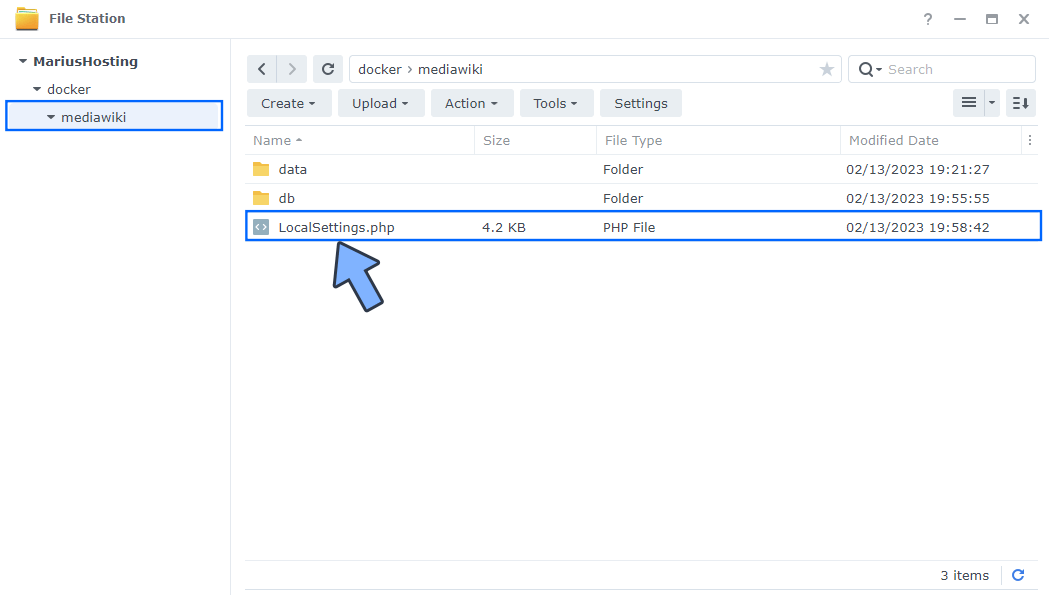
STEP 32
Open Portainer. On the left sidebar, click on Stack then mediawiki. Follow the instructions in the image below.
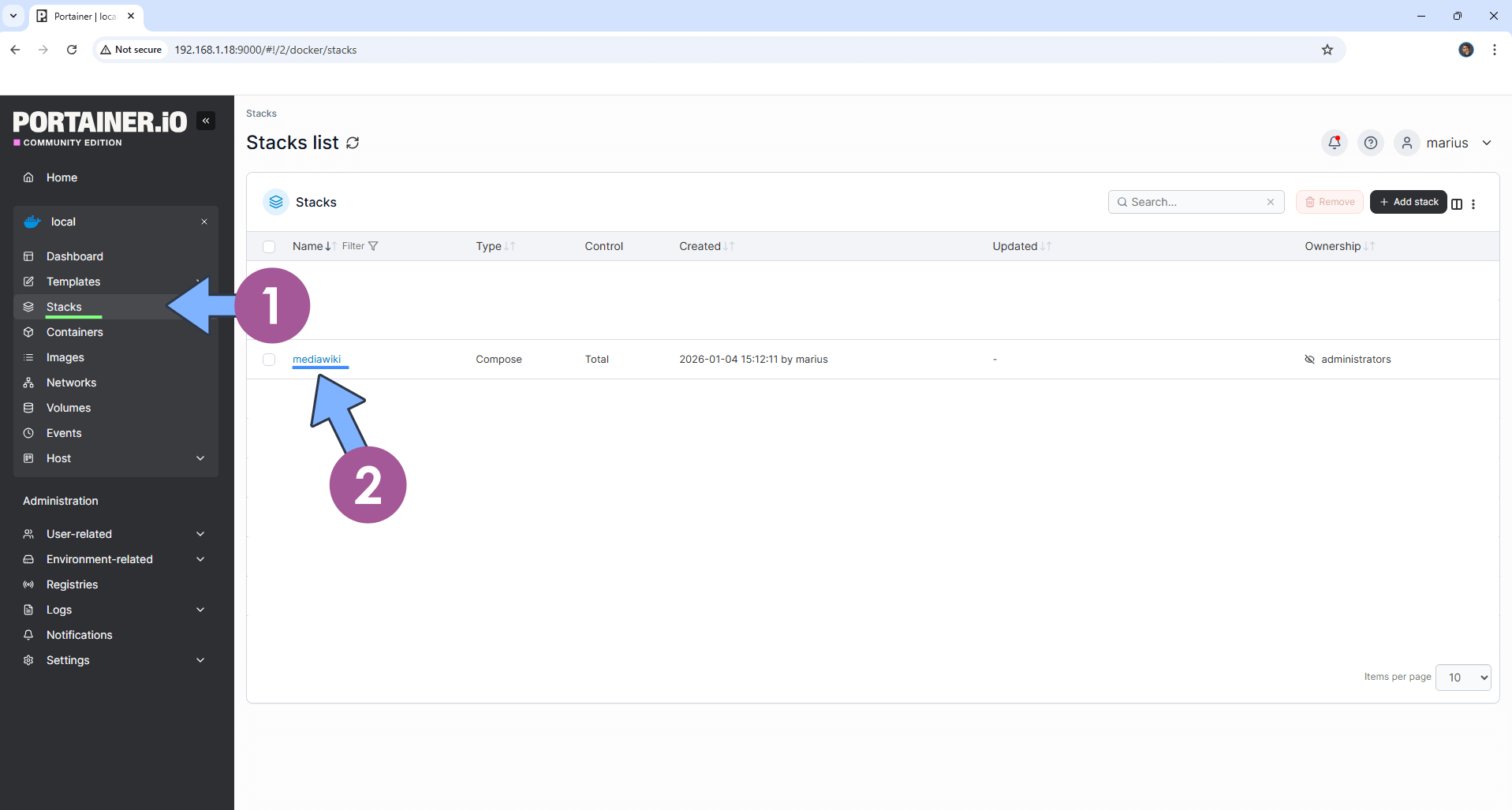
STEP 33
Click on the Editor tab. Remove the # from the code, then click Update the stack. Follow the instructions in the image below.
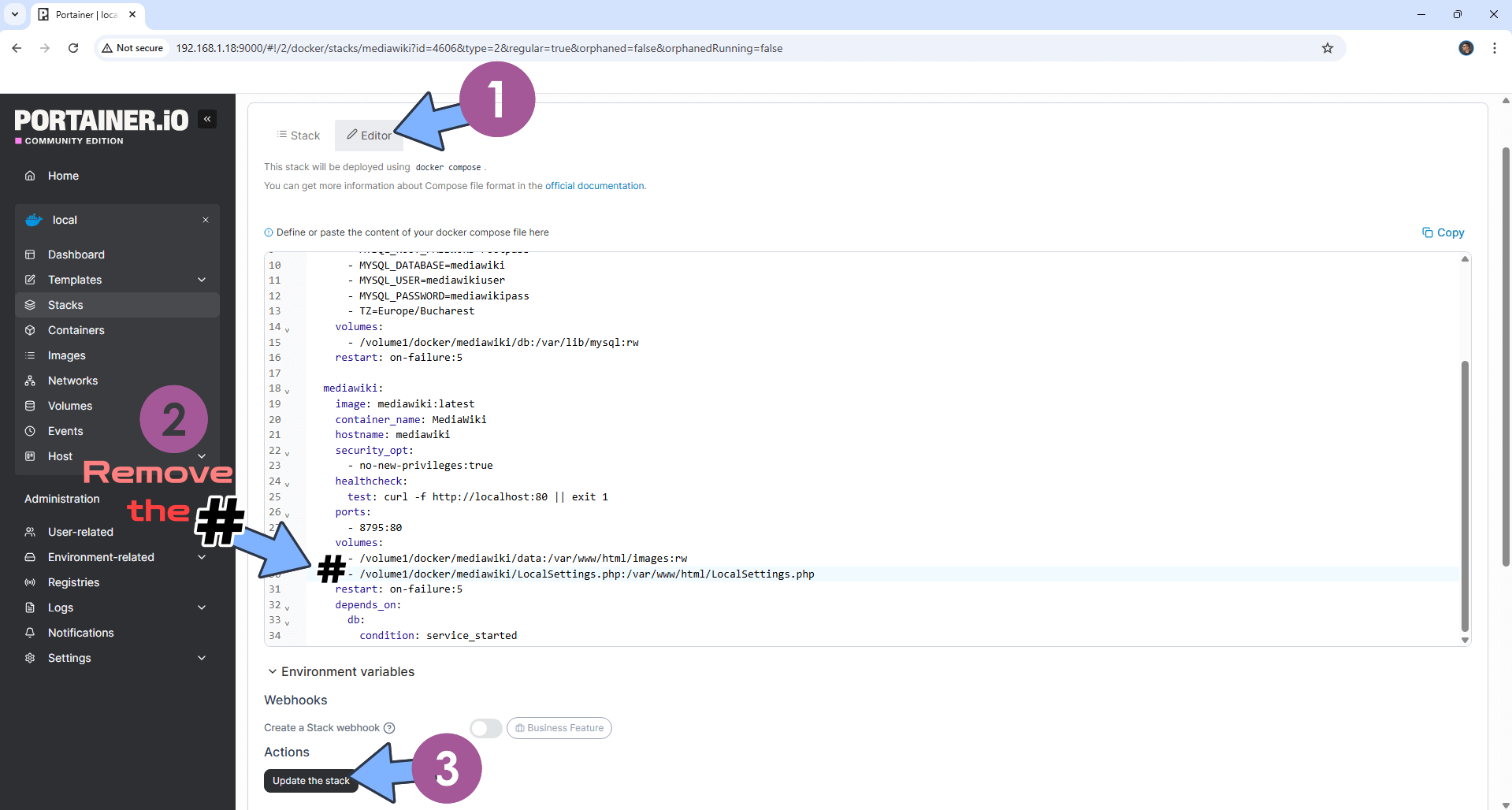
STEP 34
Click Update. Follow the instructions in the image below.
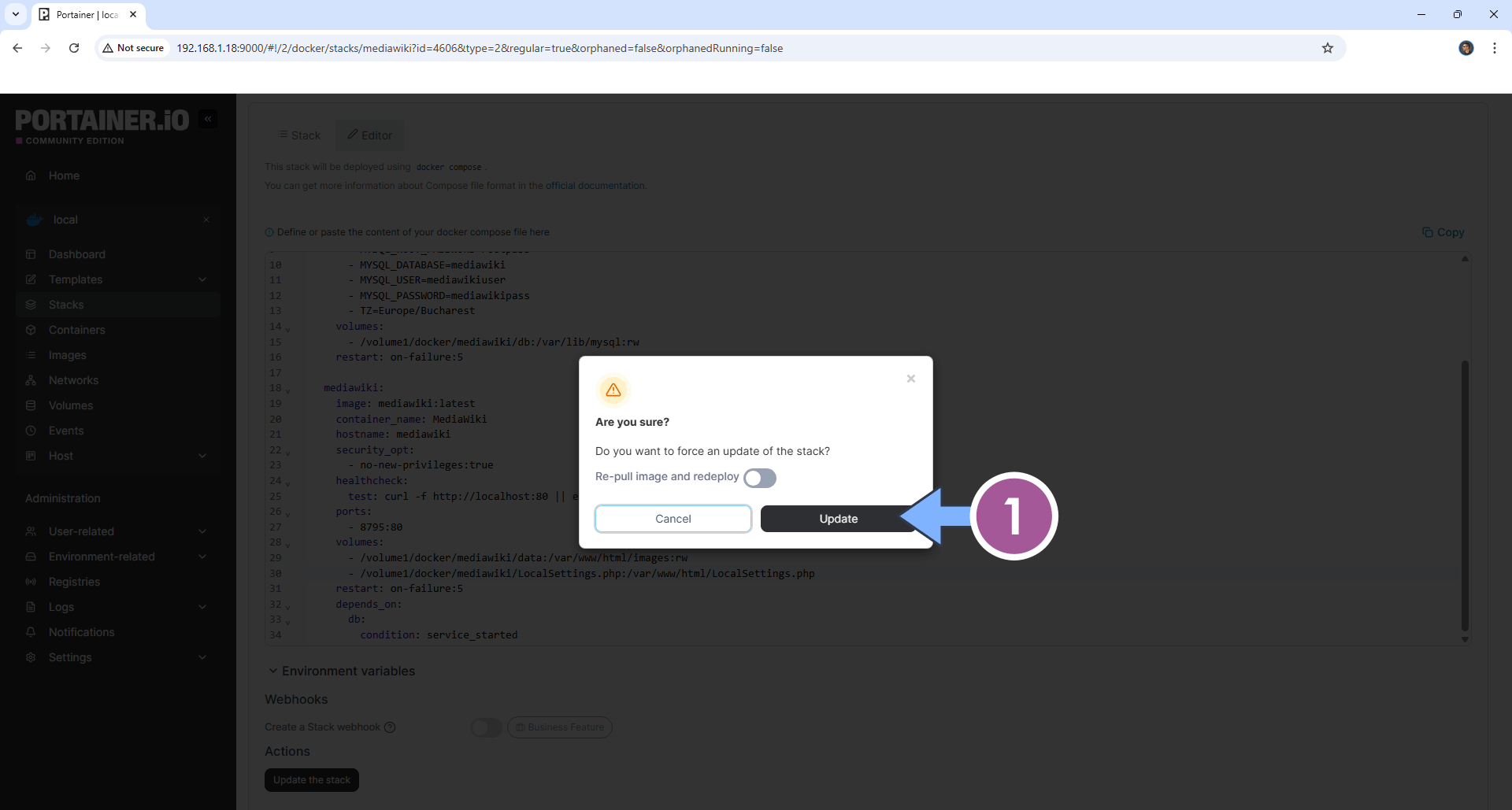
STEP 36
🟢Please Support My work by Making a Donation. Almost 99,9% of the people that install something using my guides forget to support my work, or just ignore STEP 1. I’ve been very honest about this aspect of my work since the beginning: I don’t run any ADS, I don’t require subscriptions, paid or otherwise, I don’t collect IPs, emails, and I don’t have any referral links from Amazon or other merchants. I also don’t have any POP-UPs or COOKIES. I have repeatedly been told over the years how much I have contributed to the community. It’s something I love doing and have been honest about my passion since the beginning. But I also Need The Community to Support me Back to be able to continue doing this work.
STEP 37
Now open your browser and type in your HTTPS/SSL certificate like this https://mediawiki.yourname.synology.me In my case it’s https://mediawiki.mariushosting.synology.me At the top right of the page click Log in. Type in your own Username and Password that you have previously created at STEP 26 then click Log in. Follow the instructions in the image below.
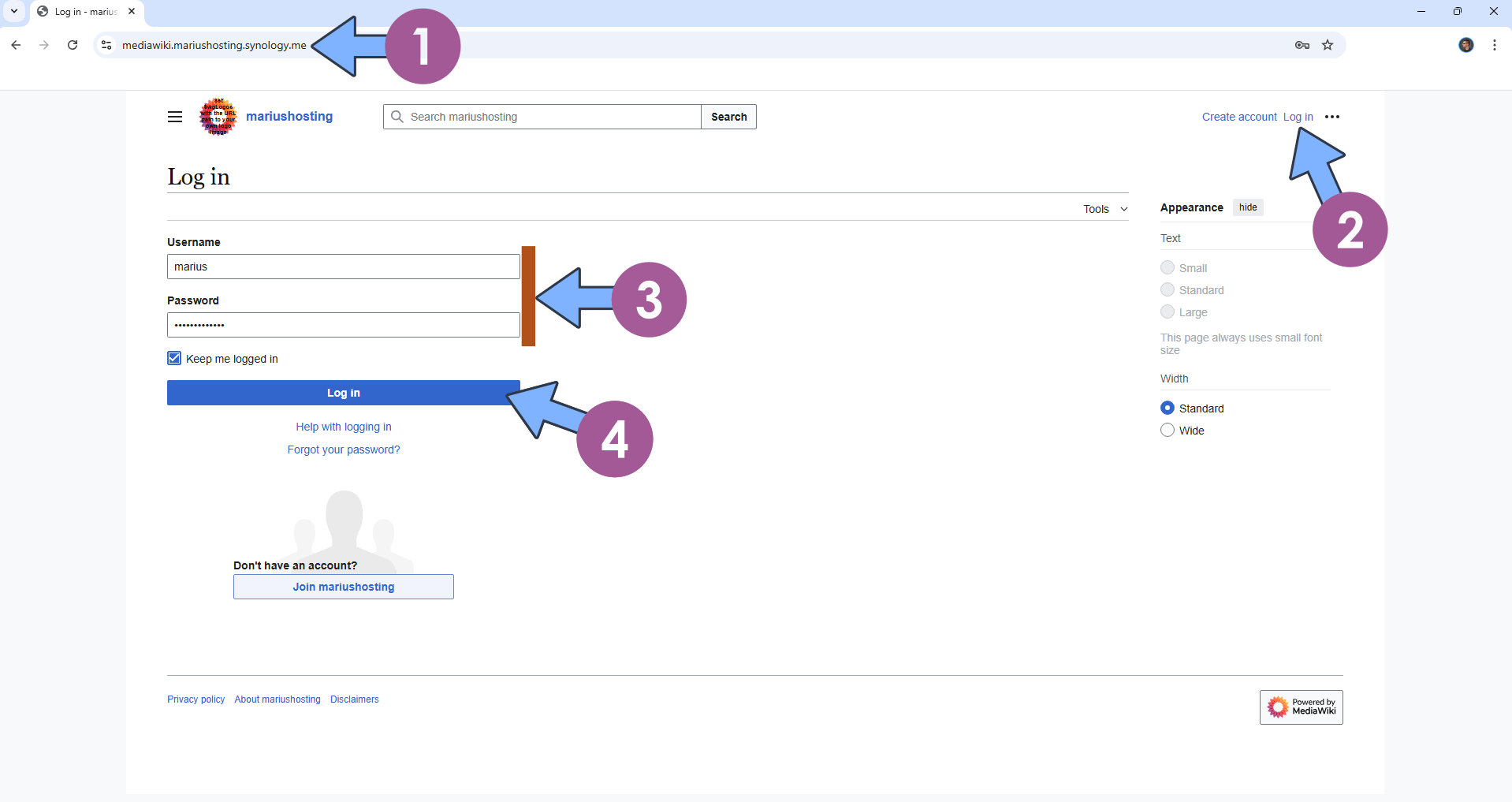
STEP 38
Your MediaWiki Dashboard at a glance!
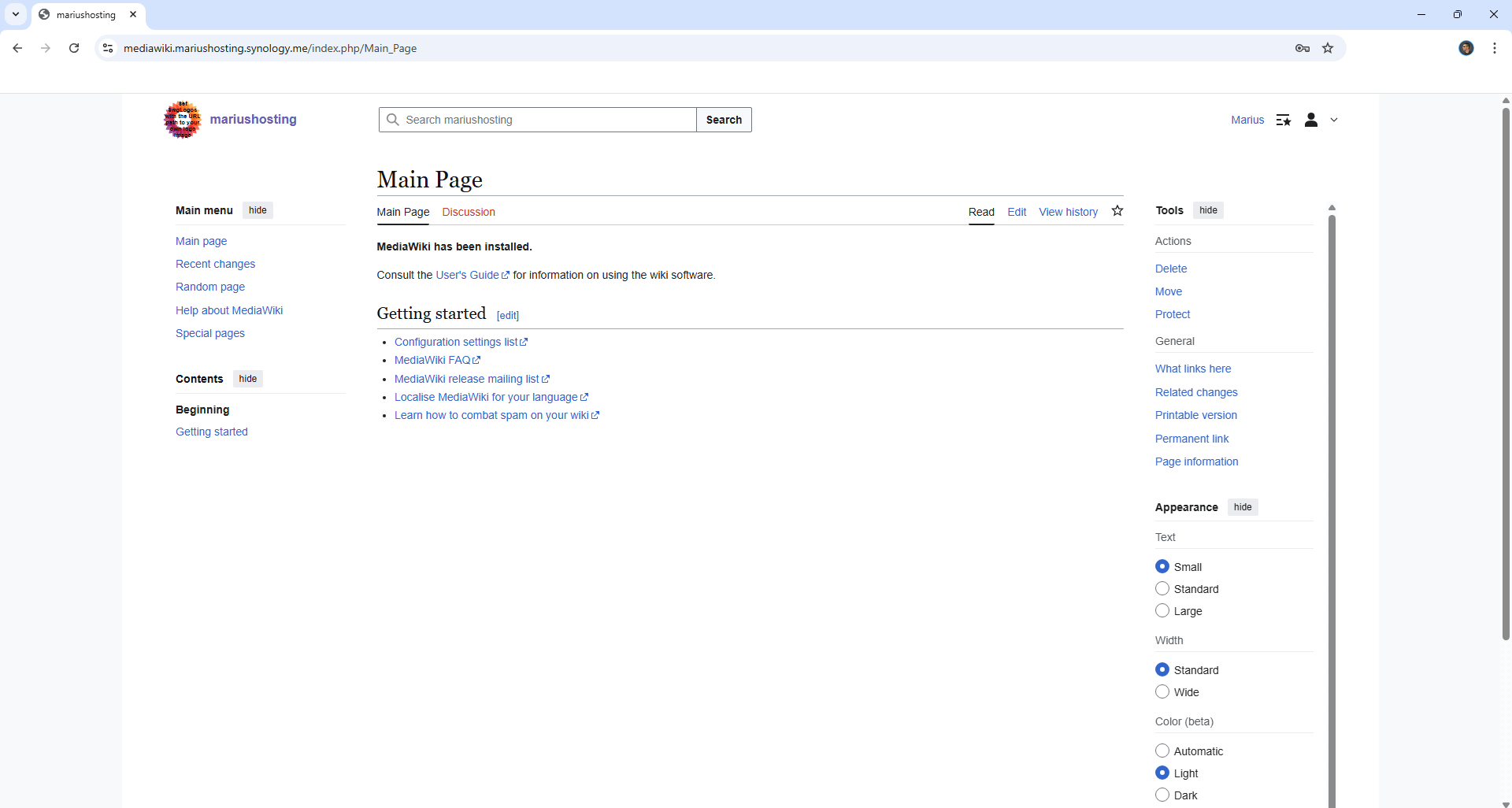
STEP 39
To customize the logo for your MediaWiki site, download the additional instructions below. Download (click on the blue link below) to download the extra instructions available as a .pdf file.🔒Note: Support my work to unlock the password. You can use this password to download any file on mariushosting forever!
Enjoy MediaWiki!
Note: Can I run Docker on my Synology NAS? See the supported models.
Note: How to Back Up Docker Containers on your Synology NAS.
Note: Find out how to update the MediaWiki container with the latest image.
Note: How to Free Disk Space on Your NAS if You Run Docker.
Note: How to Schedule Start & Stop For Docker Containers.
Note: How to Activate Email Notifications.
Note: How to Add Access Control Profile on Your NAS.
Note: How to Change Docker Containers Restart Policy.
Note: How to Use Docker Containers With VPN.
Note: Convert Docker Run Into Docker Compose.
Note: How to Clean Docker.
Note: How to Clean Docker Automatically.
Note: Best Practices When Using Docker and DDNS.
Note: Some Docker Containers Need WebSocket.
Note: Find out the Best NAS Models For Docker.
Note: Activate Gmail SMTP For Docker Containers.
This post was updated on Thursday / February 5th, 2026 at 5:31 PM
